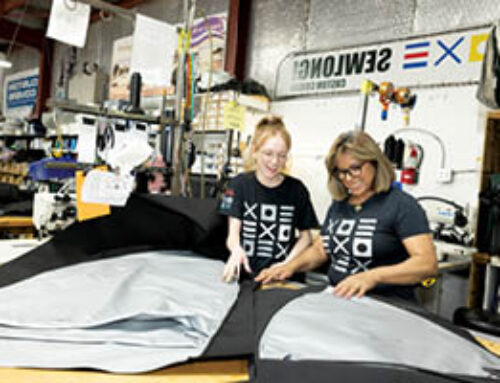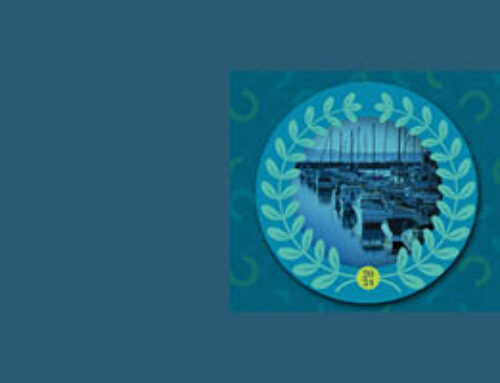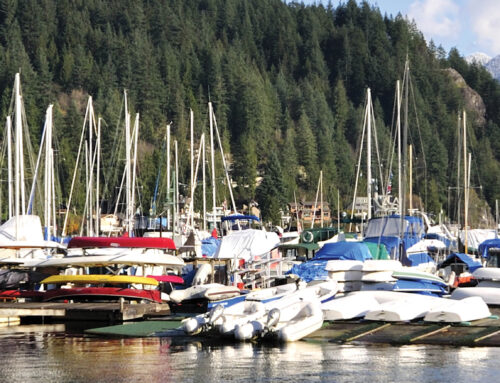On-the-job training vs. classroom workshops
Both have their advocates. Hear from the experts in the marine fabrication industry to see which fits your business.
What is the best route to become a skilled marine canvas fabricator? Focused classes or on-the-job training?
For Mark Hood, owner of Hood Marine Canvas in Merrimac, Mass., taking a series of focused classes is the best training. “By taking classes, a student gets insight into the overall process, on how something is put together, start to finish,” he says, “particularly if they are eager to get into business for themselves and start to make some money.” He underscores that everyone has a different way of teaching.
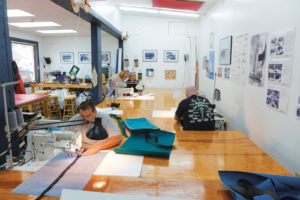
Deb Hood, left rear, of Hood Marine Canvas Training in Merrimac, Mass., guides students learning to sew zippers into cushions covers.
Hood has the sea in his blood. He grew up in a sailing family in Marblehead, Mass., the nephew of renowned sailor and boat builder Ted Hood. Both his father and uncle were successful America’s Cup sailors. After college, Mark opened Hood Canvas Co. in 1981 in Amesbury, Mass., and started fabricating canvas for boats. In the process, he befriended Ralph Hulsman of the Oakum Bay Canvas Co. in Marblehead, who fine-tuned his fabrication skills. In 2002, Mark and his wife, Deb, purchased their current commercial facility in Merrimac. Mark also spends many days in Marblehead fabricating canvas and interiors for his brother and boat builder Chris Hood of CW Hood Yachts.
In 2009, the Hoods launched their Canvas Training Workshop program, and they have been training about 60 aspiring fabricators from around the world each year. Armed with an extensive knowledge of quality canvas fabrication techniques, they team teach each of their 13 workshops, which accommodate four or five students each. They believe the small class size allows students to learn more quickly and effectively.
The Hoods’ two-, three- and four-day sessions include a Basic Workshop, workshops on Fabricating Bimini Enclosures, Dodgers, Hardtop Enclosures, Mooring Cover and Convertible Top Workshops, and a Cushion Workshop. They also offer private training workshops tailored to a shop’s individual needs. Notably, Hood is the only teacher certified a Master Fabric Craftsman by the Industrial Fabrics Association International.
Hood’s students learn to make physical patterns and they work on large model boat structures. “They learn how to go about and sequence things,” he says. “There is a systematic way of putting high-end canvas together.” Students are also provided with a comprehensive manual with illustrations and photos covering every aspect of the workshops. They also learn the business side of the marine canvas business from customer relations to marketing. As a testimonial, many former students have opened their own shops fabricating quality marine canvas at a profit, some in New England. “We provide ongoing support after classes are finished, and I even help my students solve problems in their own shops,” Hood says.
Shortening the learning curve
“We take beginners and experienced professionals,” Hood says. “I learned the old way, the school of hard knocks, examining how others put canvas together and deciding what I liked and did not like and how it could be made better. Classes can shorten the learning curve and make it easier to understand the pitfalls. However, there is a misconception that if you take one or two courses you are an accomplished marine canvas fabricator. I tell my students it takes time to learn the ins and out of the trade,” he adds. “Much of the learning happens on the job, practicing the skills they learned in our workshops with occasional guidance from us.”
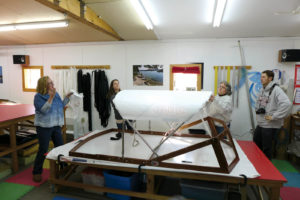
Students taking the Hoods’ Fabricating Bimini Enclosures workshop get some pointers from Deb Hood, left.
Northcoast Marine Specialties LLC is located on the western shores of Lake Erie in Port Clinton, Ohio. Its Custom Marine Canvas Training Workshops program has been operating since 1985. Unlike Hood, Russ Griffin, who owns the marine canvas shop and school with his brother Roger, came to the fabrication business as students. In former lives, Russ and Roger were in advertising and computers, respectively. In 2003, they completed the Custom Marine Canvas Training Workshops, then owned by Katie Whiting (one of six MFA founders), and opened Griffin Canvas. In 2005, the brothers purchased Custom Marine Canvas Training Workshops from Whiting and consolidated it and Griffin Canvas under its current name.
For Russ, intensive training programs are the best way to learn the trade, though he makes clear that not all canvas fabricators are equal. “There’s a big difference in how a product is designed and constructed—whether it is crappy or good canvas fabrication,” he states. “Knowing the difference is particularly relevant to training. As owners of a full-service canvas shop and training school, we keep up to date.”
Russ also notes that marine canvas fabrication techniques differ geographically due to climate. “All canvas functions for protection, but the needs of the East Coast are different from the West Coast, which are different from the Carolinas or Miami,” he states. “Knowing the difference and how it relates to training is important.” He also notes that on Lake Erie, powerboats outnumber sailboats 1,000 to one. The East Coast has more sailboats, and the West Coast and Florida have a greater number of large yachts.
International in scope, the Custom Marine Training Workshop students have hailed from the United Kingdom, Australia, Denmark, Holland, Spain and the Virgin Islands, among other countries. According to Russ, some students are professionals who want to hone their skills and others are beginners looking to break into the business. They train approximately 150 students a year and class size is limited to eight. “We teach A to Z, soup to nuts, professionals to newbies,” he says.
Flexibility isa prerequisite
Northcoast does not teach pattern making. Rather, as Russ explains it, he is a fitter, and takes materials and scissors to the boat and begins to cut. Each project is a custom fit. He believes a “high-quality production, perfection, is only achievable through a custom shop.”
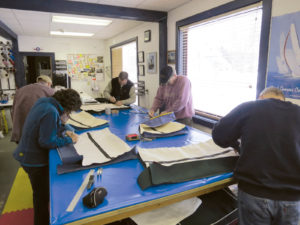
Students at Hood Marine Canvas Training assemble cushions with an angled side, a style most commonly used on sailboats.
Russ explains that as boats change in design or popularity, so do the needs of the boat owners and the marine canvas fabricator needs to adapt. “A shop owner may have to migrate from making primarily enclosures to interior upholstery. If I learn something—a new technique—I teach it,” he says. “We update the curriculum as the profession changes.” Their classes include Basic to Advanced Canvas workshops, a Pro Series for Bimini, Bridge, Aft and Camper Enclosures, Marine Upholstery, Semi-Rigid Windows and T-Top Enclosures workshops, a Sewing Machine Repair course, and two seminars titled Estimating Software and Track and Tricks.
“Our workshops are worth the money because they save time by providing the student with 30-plus years’ experience packed into just four weeks,” Russ said. Considering the pros and cons of on-the-job training, he suggested “most canvas shop owners will not teach their employees all that they need to know. By leaving out key knowledge, the shop owner knows that the employee cannot leave and become his/her competitor. The owner’s knowledge may be limited. We teach students who are already working in the trade. They are amazed about what they learn.”
Training the “competition” doesn’t seem to be a problem for Russ. “We’ve trained a lot of people who now work in the region,” he says. “We have more boats to work on than we have competition.”
He is also skeptical of shops that suddenly start training programs overnight or produce online videos to make up for lagging business. “They do have 30-, 40-, 50-plus years’ experience. They do not have a refined curriculum, and their technique may be less than quality. Often, such programs disappear as quickly as they arrive,” he says.
‘Hands-on’ a different approach
Weighing in on the other side of the debate is Mike Erickson, owner of Canvas Designers in Riviera Beach, Fla., who believes in on-the-job training. With military service and degrees in business administration and computer science under his belt, the Wisconsin native established Canvas Designers in 1985 with two employees and a sewing machine. It is now the largest custom marine canvas shop in the world, with more than 40 employees.
Erickson works closely with a local marine charter school to recruit students who already have some real-world training. “These students have a well-rounded marine education and are already oriented to boats,” Erickson says. “The students are also well-equipped in technology.”
Erickson’s business designs, manufactures, and delivers custom products including canvas, interior and exterior upholstery, EZ2CY and soft enclosures, blinds, and metal fabrication. They work on everything from small boats to mega yachts. Canvas Designers is also a totally digital canvas shop, and its CAD department offers 2D and 3D digitizing, drafting and modeling. Highly specialized, Canvas Designers is structured into departments. “We have a division of labor; I train no one to go out and start their own canvas shop,” Erickson says. “We have found that the best way to grow a business is to train our employees from scratch, which makes us more successful than some other shops. Our employees stay with us.”
Jeff Almas started his canvas shop, Sew Your Boat in Toledo, Ohio, more than 20 years ago and began to offer classes in 2011. He offers four classes: Canvas 101, The Beginning; Canvas 202, The Intermediate; Canvas 303, Marine Upholstery, and Canvas 404, The Advanced Course.
Casual with a humorous air about him, Almas calls himself the “Canvas King.” Like Mark Hood and Russ Griffin, he acknowledges there is more than one way to learn the marine canvas trade. “On-the-job training is a much slower way to learn,” he believes. “Classes offer a faster pace in a more concentrated environment. If you need to get out there and start to make money, taking six weeks of courses is the start of a new career.” Almas says he always provides follow-up support to his students.
He says he does not usually train students from the region. “You have to invest in your own career and yourself,” he says. “You have to ask questions, and that happens in classes. On-the-job training may not provide employees with an overview about what marine canvas fabrication really requires.”
In 2003, Dawn Taylor bought the Marine Canvas Training Institute in West Palmetto, Fla., from her father, Don Wedge, when he retired. (Don had opened the school in 1982 to complement his marine canvas shop.) Learning the trade from her father, Dawn offers five comprehensive classes that run five days each: Basic Boat Canvas and Advanced Boat Canvas I & II, Boat Upholstery and Estimating Business. The classes are repeated every month except in June, July and August, when she teaches one-on-one classes.
“Our courses are good for students who have to learn quickly so they can go out and start their own business,” she says. Class size is small with no more than six students, who have come from the United Kingdom, Bermuda, Canada and across the United States. “They learn to pull patterns, to cut and sew, and eventually to install projects,” Taylor says. Each student also receives a series of training videos, “to reinforce what they have just learned.”
“The hands-on classes are intense, and the students have to learn quickly in a short time frame,” Taylor explains. “With on-the-job training, some employers do not have the time to teach all facets of the business, employees only know how to do one thing.” Taylor’s students are often employees from other canvas shops who need to learn new skills and how to produce quality work.
Her advice for students: “Take on the small boats first, don’t go home and take on huge jobs. You have to be comfortable with your skills and keep learning.”
Mason Riddle is a freelance writer from St. Paul, Minn.
 TEXTILES.ORG
TEXTILES.ORG 


